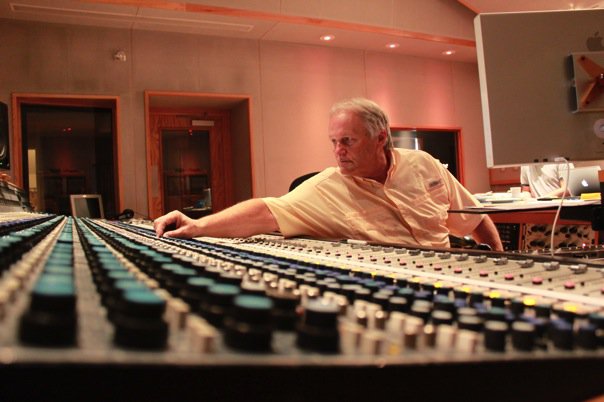Audio engineer on:
[Wikipedia]
[Google]
[Amazon]
An audio engineer (also known as a sound engineer or recording engineer) helps to produce a recording or a live performance, balancing and adjusting sound sources using equalization, dynamics processing and audio effects, mixing, reproduction, and reinforcement of sound. Audio engineers work on the "technical aspect of recording—the placing of microphones, pre-amp knobs, the setting of levels. The physical recording of any project is done by an engineer... the nuts and bolts."
Sound engineering is increasingly seen as a creative profession where musical instruments and technology are used to produce sound for film, radio, television, music and video games. Audio engineers also set up, sound check and do live sound mixing using a mixing console and a sound reinforcement system for music concerts, theatre, sports games and corporate events.
Alternatively, ''audio engineer'' can refer to a scientist or professional engineer who holds an engineering degree and who designs, develops and builds audio or musical technology working under terms such as acoustical engineering, electronic/electrical engineering or (musical) signal processing.
"The Engineers Who Changed Recording: Fathers Of Invention"
'' Sound on Sound'' magazine, October 2004 They might design acoustical simulations of rooms, shape algorithms for audio signal processing, specify the requirements for
 Audio engineers in research and development usually possess a
Audio engineers in research and development usually possess a
 Architectural acoustics is the science and engineering of achieving a good sound within a room. For audio engineers, architectural acoustics can be about achieving good speech intelligibility in a stadium or enhancing the quality of music in a theatre. Architectural Acoustic design is usually done by acoustic consultants.
Architectural acoustics is the science and engineering of achieving a good sound within a room. For audio engineers, architectural acoustics can be about achieving good speech intelligibility in a stadium or enhancing the quality of music in a theatre. Architectural Acoustic design is usually done by acoustic consultants.
 Electroacoustics is concerned with the design of headphones, microphones, loudspeakers, sound reproduction systems and recording technologies. Examples of electroacoustic design include portable electronic devices (e.g. mobile phones,
Electroacoustics is concerned with the design of headphones, microphones, loudspeakers, sound reproduction systems and recording technologies. Examples of electroacoustic design include portable electronic devices (e.g. mobile phones,
Research and development
Research and development
Research and development (R&D or R+D), known in Europe as research and technological development (RTD), is the set of innovative activities undertaken by corporations or governments in developing new services or products, and improving existi ...
audio engineers invent new technologies, audio software, equipment and techniques, to enhance the process and art of audio engineering.Daley, Dan"The Engineers Who Changed Recording: Fathers Of Invention"
'' Sound on Sound'' magazine, October 2004 They might design acoustical simulations of rooms, shape algorithms for audio signal processing, specify the requirements for
public address
A public address system (or PA system) is an electronic system comprising microphones, amplifiers, loudspeakers, and related equipment. It increases the apparent volume (loudness) of a human voice, musical instrument, or other acoustic sound sou ...
systems, carry out research on audible sound for video game console manufacturers, and other advanced fields of audio engineering. They might also be referred to as acoustic engineers.
Education
Audio engineers working in research and development may come from backgrounds such asacoustics
Acoustics is a branch of physics that deals with the study of mechanical waves in gases, liquids, and solids including topics such as vibration, sound, ultrasound and infrasound. A scientist who works in the field of acoustics is an acoustician ...
, computer science
Computer science is the study of computation, automation, and information. Computer science spans theoretical disciplines (such as algorithms, theory of computation, information theory, and automation) to practical disciplines (includin ...
, broadcast engineering, physics, acoustical engineering, electrical engineering
Electrical engineering is an engineering discipline concerned with the study, design, and application of equipment, devices, and systems which use electricity, electronics, and electromagnetism. It emerged as an identifiable occupation in the l ...
and electronics. Audio engineering courses at university or college fall into two rough categories: (i) training in the creative use of audio as a sound engineer, and (ii) training in science or engineering topics, which then allows students to apply these concepts while pursuing a career developing audio technologies. Audio training courses provide knowledge of technologies and their application to recording studio
A recording studio is a specialized facility for sound recording, mixing, and audio production of instrumental or vocal musical performances, spoken words, and other sounds. They range in size from a small in-home project studio large enoug ...
s and sound reinforcement system
A sound reinforcement system is the combination of microphones, signal processors, amplifiers, and loudspeakers in enclosures all controlled by a mixing console that makes live or pre-recorded sounds louder and may also distribute those sounds ...
s, but do not have sufficient mathematical and scientific content to allow someone to obtain employment in research and development in the audio and acoustic industry.
 Audio engineers in research and development usually possess a
Audio engineers in research and development usually possess a bachelor's degree
A bachelor's degree (from Middle Latin ''baccalaureus'') or baccalaureate (from Modern Latin ''baccalaureatus'') is an undergraduate academic degree awarded by colleges and universities upon completion of a course of study lasting three to six ...
, master's degree or higher qualification in acoustics, physics, computer science or another engineering discipline. They might work in acoustic consultancy, specializing in architectural acoustics. Alternatively they might work in audio companies (e.g. headphone
Headphones are a pair of small loudspeaker drivers worn on or around the head over a user's ears. They are electroacoustic transducers, which convert an electrical signal to a corresponding sound. Headphones let a single user listen to an au ...
manufacturer), or other industries that need audio expertise (e.g., automobile manufacturer), or carry out research in a university. Some positions, such as faculty (academic staff)
Academic personnel, also known as faculty member or member of the faculty (in North American usage) or academics or academic staff (in British, Australia, and New Zealand usage), are vague terms that describe Teacher, teachers or research staff of ...
require a Doctor of Philosophy
A Doctor of Philosophy (PhD, Ph.D., or DPhil; Latin: or ') is the most common degree at the highest academic level awarded following a course of study. PhDs are awarded for programs across the whole breadth of academic fields. Because it is ...
. In Germany a ''Toningenieur'' is an audio engineer who designs, builds and repairs audio systems.
Sub-disciplines
The listed subdisciplines are based on PACS (Physics and Astronomy Classification Scheme The Physics and Astronomy Classification Scheme (PACS) is a scheme developed in 1970 by the American Institute of Physics (AIP) for classifying scientific literature using a hierarchical set of codes. PACS has been used by over 160 international jo ...
) coding used by the Acoustical Society of America with some revision.
Audio signal processing
Audio engineers develop audio signal processing algorithms to allow the electronic manipulation of audio signals. These can be processed at the heart of much audio production such asreverberation
Reverberation (also known as reverb), in acoustics, is a persistence of sound, after a sound is produced. Reverberation is created when a sound or signal is reflected causing numerous reflections to build up and then decay as the sound is abso ...
, Auto-Tune or perceptual coding (e.g. MP3 or Opus). Alternatively, the algorithms might perform echo cancellation, or identify and categorize audio content through music information retrieval or acoustic fingerprint.
Architectural acoustics
Electroacoustics
 Electroacoustics is concerned with the design of headphones, microphones, loudspeakers, sound reproduction systems and recording technologies. Examples of electroacoustic design include portable electronic devices (e.g. mobile phones,
Electroacoustics is concerned with the design of headphones, microphones, loudspeakers, sound reproduction systems and recording technologies. Examples of electroacoustic design include portable electronic devices (e.g. mobile phones, portable media player
A portable media player (PMP) (also including the related digital audio player (DAP)) is a portable consumer electronics device capable of storing and playing digital media such as audio, images, and video files. The data is typically stored o ...
s, and tablet computers), sound systems in architectural acoustics, surround sound and wave field synthesis in movie theater
A movie theater (American English), cinema (British English), or cinema hall ( Indian English), also known as a movie house, picture house, the movies, the pictures, picture theater, the silver screen, the big screen, or simply theater is a ...
and vehicle audio.
Musical acoustics
Musical acoustics is concerned with researching and describing the science of music. In audio engineering, this includes the design of electronic instruments such assynthesizers
A synthesizer (also spelled synthesiser) is an electronic musical instrument that generates audio signals. Synthesizers typically create sounds by generating waveforms through methods including subtractive synthesis, additive synthesis and ...
; the human voice (the physics and neurophysiology
Neurophysiology is a branch of physiology and neuroscience that studies nervous system function rather than nervous system architecture. This area aids in the diagnosis and monitoring of neurological diseases. Historically, it has been dominated b ...
of singing
Singing is the act of creating musical sounds with the voice. A person who sings is called a singer, artist or vocalist (in jazz and/or popular music). Singers perform music (arias, recitatives, songs, etc.) that can be sung accompaniment, wi ...
); physical modeling of musical instruments; room acoustics
Room acoustics is a subfield of acoustics dealing with the behaviour of sound in enclosed or partially-enclosed spaces. The architectural details of a room influences the behaviour of sound waves within it, with the effects varying by frequency ...
of concert venues; music information retrieval; music therapy
Music therapy, an allied health profession, "is the clinical and evidence-based use of music interventions to accomplish individualized goals within a therapeutic relationship by a credentialed professional who has completed an approved music th ...
, and the perception and cognition of music
Music is generally defined as the The arts, art of arranging sound to create some combination of Musical form, form, harmony, melody, rhythm or otherwise Musical expression, expressive content. Exact definition of music, definitions of mu ...
.
Psychoacoustics
Psychoacoustics
Psychoacoustics is the branch of psychophysics involving the scientific study of sound percep